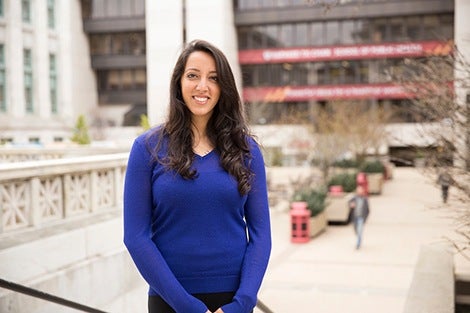May 12, 2017—Rahima Dosani, MPH ’17, has led efforts to increase patients’ access to vaccines and HIV testing in Malawi, and tuberculosis testing in Myanmar. Now about to graduate from Harvard T.H. Chan School of Public Health with a degree in global health and population, she’s hoping to ultimately open her own global health consulting firm to help improve health care delivery for the world’s poorest populations.
Dosani earned an MBA at Harvard Business School last year before entering Harvard Chan School. She sees her combination of public health skills and values and business acumen as a means to fill a need in the field. “There are a lot of companies, countries, and institutions that have found really wonderful solutions to global health challenges. I want to help them scale up their programs and implement them more efficiently,” she said. “Large-scale change on a global level is what I get really excited about.”
With her background in business, Dosani is able to draw on marketing insights in a powerful way, said her advisor Jesse Bump, lecturer on global health policy. “She’s able to think of public health solutions based on how people actually behave. That, combined with her extraordinary intellectual abilities, makes me look forward to seeing what she produces in the years to come.”
Dosani also brings an immigrant’s outsider perspective to her work, and a keen sense of the ways that people’s health is influenced by their environments. Born in Pakistan to a Kenyan father and an Indian mother, Dosani spent most of her childhood in Atlanta, Georgia. Growing up, she was one of just a few people of color in her school, and the only Muslim.
“I’ve always been so aware of how different I was from a very early age. It made me realize that everyone can feel very isolated at times, and it pushed me to want to bring people together,” she said. “I never considered a career where I wasn’t doing something to help or serve in some way, and I always had a particular interest in people whose voices are not being heard.”
From Malawi to Myanmar
Prior to college, Dosani interned for the Aga Khan Education Services and the Government of Pakistan on the development of a new health education curriculum for Karachi schools. The experience spurred an interest to learn and do more for the health of poor and vulnerable people, and as a college sophomore at the University of Pennsylvania, she discovered that there was an area of study focused on her emerging interests.
“As soon as I took my first class in public health, I knew that this was where I wanted to spend the rest of my life,” Dosani said.
After three years as a management consultant focusing on improving the effectiveness of healthcare organizations, Dosani joined the Clinton Health Access Initiative (CHAI) to get experience in the field. She moved to Malawi, where she helped accelerate patient access to rotavirus and other vaccines. She then led a team tasked with increasing access to HIV testing in the country. In that role, she helped Malawi become the second African country to test HIV patients’ viral load using finger-prick technology—which makes the test easier to perform in resource-poor settings—and expanded access to the test to more than 35,000 patients during her time there. She also oversaw a 20% expansion of the number of babies in Malawi who received HIV testing.
In 2014, Dosani was asked to move to Myanmar to help CHAI launch new offices in Yangon and Nay Pyi Daw. There, she conducted market intelligence analyses that convinced new suppliers to enter the tuberculosis testing market, leading to increased competition and reduced pricing for new testing technologies.
A safe place
Dosani applied to Harvard Chan School to gain expertise in the areas of biostatistics, epidemiology, and monitoring and evaluating health interventions. She received funding from the Zuckerman Fellows Program, based at the Center for Public Leadership at Harvard Kennedy School, to attend Harvard Chan.
During her time at the School, she found not only inspiration from her passionate and driven fellow students, but a safe place to work on her public speaking. Dosani has a stutter, which has been a source of both insecurity and strength.
“Stuttering is a disability that you can’t hide. It forces you to continually put yourself out there and be vulnerable,” Dosani said. She’s found that this inspires those with whom she’s interacting to put their own guards down. “It reminds people that we all have our challenges that we are working on, that we’re all the same, and we’re all connected.”
Photo: Sarah Sholes
